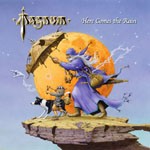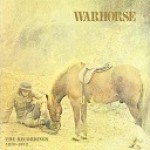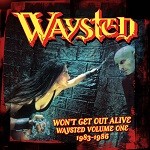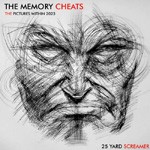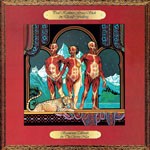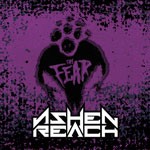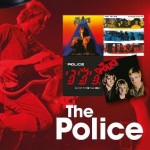Share the post "Album review: BLACK SABBATH – The Ten Year War (Box Set)"
BMG [Release date 29.09.17]
Black Sabbath’s Ozzy-fronted albums have been given a monster remaster and the full luxury box set re-issue treatment. It is quite a piece of work.
The package has even had a roadshow of launch events. The playback shindig at the Gibson Rooms recently was used to give the audio quality of the new MQA digital format a full state-of-the-art PA system workout.
We were also treated to some good chat with Tom Allom, engineer on the first three landmark Sabs albums and Andy Pearce who has sprinkled his magic remaster dust over this eight-album package.
The exposed brick basement was low-lit and packed with label and band execs sporting Black Sabbath crucifix USB sticks on chains around their necks. You could be forgiven for thinking that the assembled media types, tech heads and hacks were in for a dark sermon. However, I was grateful for the dim surroundings which hid my blatant wardrobe malfunction. Inexplicably, I was wearing my ‘Fender’ T-shirt to a Gibson-hosted bash.
We learned that ‘The Ten Year War’ box set has been two years in the making: tracking down and comparing original tapes, cleaning up the sound, perfecting the digital quality, clearing the tracks with the band.
The name of the package comes from a rare brochure produced by the band themselves which pulled together some early press clippings slaughtering them and their style. We heard entertaining snippets from original Rolling Stone reviews, amongst others, that rubbished ‘Black Sabbath’ with some inexplicable – with the hindsight that 47 years brings – comparisons to Cream and Eric Clapton.
Of course there simply were no other benchmarks for what Sabbath were bringing to the party. In a nutshell, that’s why, all these years later, we gathered in a dark basement to mark a relaunch.
Allom raised a laugh when he said that he wasn’t a fan of the band at first. “I just didn’t get it. But they were so professional. We recorded that album in two days. Like a live set.”
Stories about the recording process were gold. Like not needing to mic up Geezer’s bass because it was so loud already. And Bill Ward recording the entire ‘Paranoid’ album with his foot in plaster.
Andy Pearce said he recognised that there was a burden of cultural responsibility for his part in the process. The event majored, understandably, on the quality of the remasters and on the significant improvement to the digital sound brought through MQA technology.
The burning question is what do we have here?
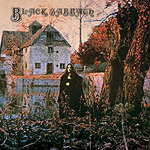
Black Sabbath (1970)
Tom Allom said that the thunder, rain and tolling bell in the first few moments of the album was producer Rodger Bain’s idea. Genius, of course. Oft copied, never bettered. Even the most cynical minds must sense the foreboding drama that gives way to Iommi’s colossal, ground-breaking riff and Butler’s doom-laden lyrics. Defining moments in rock ‘n’ roll and I make no apology for the verbosity.
The remastering process has added value to the overall sound, but it’s often in the detail where the benefit is felt to best effect. Take ‘NIB’. The opening riff is as deliciously thick as treacle. Every distorted vibration of the strings on Iommi’s black Gibson crawls out of the speaker like we are in the studio with Allom and the boys.
‘Black Sabbath’ has lots of complex moments as well. This first album set the template for pretty much for the rest of their career for involved arrangements, time changes, and songs within songs. The instrumental sections on ‘Warning’ have psychedelic and blues influences. There’s a real Doors feeling about the track. ‘Sleeping Village’ picks up with remarkably clarity the double tracked guitars, flowing into some prog-like instrumental breaks. And where does Ozzy’s High Plains Drifter-style harp on ‘The Wizard’ come from?
Pioneering. ****½
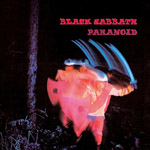
Paranoid (1970)
Within months, the band, Bain and Allom were back in the same studio for the follow up. Allom explained that the band still had plenty of material tucked away in their kit bag from their early Sabbath and pre-Sabbath days playing under the name Earth.
The album, like their debut, was in the can in equally short order. However, not quite so smoothly. The unsuspecting record buying public had taken to ‘Black Sabbath’ and its terrifying sound in droves. Consequently, the label wanted a hit single. So Iommi and the band decamped to the pub and pretty swiftly came up with ‘Paranoid’. At the last minute this also became the album title. The label had their hit and the band had, arguably, an even finer album.
Certainly the standout tracks have withstood the ravages of time. We all know about ‘Paranoid’. Alongside it, the heroic, cacophonous riffs of ‘War Pigs’ and ‘Iron Man’ remain spine-tinglingly good in their cleaned up form. The biggest sounds of their entire career are on this platter.
The band already seemed more assured here. Particularly Ozzy. On ‘Electric Funeral’ the mainman was already developing that wry, ironic style of vocal delivery that he employed to great effect on subsequent outings. ‘Hand of Doom’ sees him experimenting with shades of a drawling tone and hints of the gruffer, belly growl that surfaced in full effect on later albums.
The contrasts are there too. The whimsical ‘Planet Caravan’ keeps everything grounded, ‘Fairies Wear Boots’ is built around a gorgeous blues shuffle for its main theme; and ‘Rat Salad’ chucks in a hint of the breadth of Ward’s drumming.
Emphatic. *****
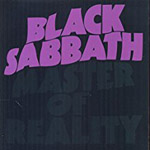
Master of Reality (1971)
This was the last album recorded by the Rodger Bain/Tom Allom axis. Tom comments that it was harder to record and took more time because the band had used up their well of early material. The schedule of touring, promoting, recording was already taking its toll on the time to write songs.
The end result is an album even heavier and darker than its predecessors. Iommi down-tuned his strings on ‘Children Of The Grave’, ‘Into The Void’ and others to produce a dense, hard sound given a dry twist in these remastered versions. The sounds and lyrical themes were to become so influential amongst the later doom and stoner generations.
Ward’s drumming on ‘Children Of The Grave’ is spell-binding. Allom commented that he and Geezer Butler had a great understanding in the studio and their timing and playing evoked a jazz style. Certainly Ward’s playing on these albums contrasts massively with the same material played live on the recent ‘The End’ tour where tour drummer Tommy Clufetos was heard to smash seven shades of shining out of his kit.
‘Sweat Leaf’ inspired by some new recreational habits and ‘After Forever’ provide the album’s most accessible tracks. The latter also features the first hints of synthesizer, played by Iommi, which gives the track a distinctive flavour.
Influential. ****½

Vol 4 (1972)
Although at the time Vol 4 was regarded as experimental with its use of strings and spare ballads, the album stands up massively. The harsher, shadowy stance of ‘Master of Reality’ still forms the core of this Iommi-produced record – witness track likes ‘Tomorrow’s Dream’ and the immense ‘Cornucopia’. But there’s a whole lot more going on that sees the sound stretch out.
The opener ‘Wheels of Confusion’ sets the tone with Ozzy’s almost uplifting vocal melody over the top of the guttural main riff. The instrumental passage towards the end of the track is delicious. Likewise, ‘Supernaut’ is simply superb. A crunching couple of riffs set the track up over Geezer’s swelling bass and Ozzy punching holes through the wall of sound with sharp lyrics. Even funky flamenco guitar interlude works. I’m not sure the band ever bested this.
Unless, that is, you consider that they did so on the very next track. ‘Snowblind’ was to be the name of the album, a transparent reference to its cocaine-influenced recording process, until the record company put their foot down. Ozzy’s vocal performance is one of his most plaintive and Bill Ward weaves some challenging patterns over the bassline. The spikes of synth and lead guitar lift the track into the stratosphere.
The album is probably the most complete of the Ozzy era. Where, for all the drug-intake, somehow their experience shone through before cynicism, infighting and narcotic abuse became too corrosive.
Sublime. *****
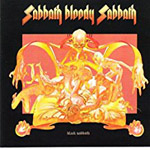
Sabbath Bloody Sabbath (1973)
The title track is an absolute killer. A sprawling riff complemented beautifully by Ozzy’s soaring vocal. There are some tender moments here, immediately counterpointed by sharp, biting guitar and descending rhythms. The outro is exceptional. Light and shade in an expansive format, the way that only Sabbath can pull off.
Nothing else on the album comes close. For my money, ‘SBS’ is the least intense, most disjointed of their Ozzy-era output. There were reports that the band were pretty much burning out by this period. This collection could well be testimony to that view. Or maybe the desire to experiment left a mark. Even the microscopic remastering of this material can’t build in cohesion and, well, heaviness. There are moments – all of ‘Killing Yourself To Live’, bits of ‘A National Acrobat’, most of ‘Sabra Cadabra’ – that hit the heights, but the overall impression is of a lack of direction and power.
A middling effort, lifted significantly by the title track alone.
Inconsistent. ***½
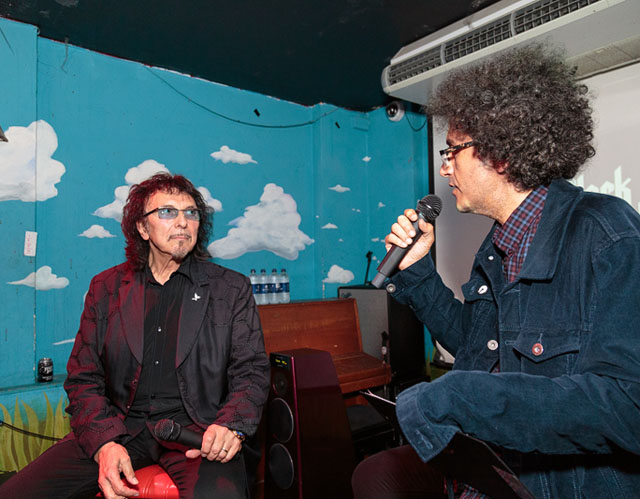
In June 1970, Black Sabbath recorded Paranoid at Regent Sound Studios in Soho. Some 47 years later, and shortly after the end of The End tour, invited members of the press returned to the same venue to see Sabbath launch The Ten Year War collection.
The hosted launch provided glimpses of the history of recording Sabbath through the personal appearance of metal royalty Tony Iommi, supported by Bill Ward via a recorded interview.
Iommi, in person, was warmly greeted as he reminisced about the development of Sabbath as a band, the development of the sound and how the band developed its local fan base and the initial distaste for the band by the UK press. The title of the box set reflects that for ten years the British press did not universally support the band.
Whilst Iommi commented that touring had come to an end, For Sabbath fans there was some potential good news though as he hinted that there was wish to work with the other band members again and this may include some limited live work.
Report and photo: Paul Clampin
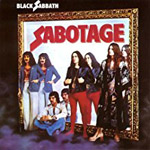
Sabotage (1975)
Despite on-going litigation with their former manager during the recording of this album, ‘Sabotage’ was a massive return to form. It strikes a productive balance between heavy, dirty tracks and the experimental, creative sound.
‘Hole In The Sky’ and ‘Symptom of the Universe’ are epic, power-laden slabs of darkness. Ozzy is visceral with Geezer’s monumental lyrics. Sabbath at their muscular best. The latter has been cited as a catalyst for the 80’s thrash movement.
The remastering really comes into its own on the impressive ‘Megalomania’ where the cleaned up keyboards on the early section provide added substance; and on the thumping bass under the raw and then synthesised mid-section riffs. Ozzy here is smashing up the lyrics with real zeal and energy. The use of backing vocals brings a rarely used dynamic. The frontman is similarly animated on album closer, ‘The Writ’, a track for which he penned the lyrics. This album captures some of his best singing.
When Sabbath are on form they have a knack of chucking ingredients into the mixing console and coming out gems instead of turkeys. ‘Supertzar’ could be film music in more clumsy hands with its choir placed front and centre, but somehow hangs on to an edge; ‘Am I Going Insane (Radio)’ has a commercial twang that nevertheless easily stays the right side of a pop mediocrity.
Expansive. *****
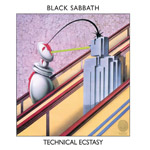
Technical Ecstasy (1976)
Technical Ecstasy doesn’t always get the praise it deserves – sometimes from the band themselves. Yet it has plenty of high points: ‘Back Street Kids’ is a traditional Sabbath barn-storming album opener; ‘Rock ‘n’ Roll Doctor’ still gets the blood pumping with its scything riff, honkey-tonk piano and Bill Ward in powerhouse mode; and ‘Dirty Women’ has a great guitar/keyboard groove, surprisingly given an airing on the recent ‘The End’ tour.
Nevertheless, it is easy to see why it is less loved than the earlier classics. In some ways it is a product of the times. The turbulent music scene, not to mention tensions within the band led to an album lacking intensity. The tracks are on the whole shorter and less complex than on earlier outings. More worryingly, the production feels lightweight and a little too clean.
That said, this was the last Sabs album I got to know, back in the day, and it is a grower. The remastered tracks reveal subtleties and layers that are less obvious on earlier albums. The keyboard on ‘You Won’t Change Me’ comes shining through and Geezer’s grinding, funky bass on ‘All Moving Parts (Stand Still)’ gets a welcome boost.
At worst, the album stands accused of being half-hearted. Ozzy doesn’t attack the vocals (‘Rock ‘n’ Roll Doctor’ and bits of ‘Dirty Women’ excepted) in the way he does at his best. And some of the compositions are lazy and hackneyed. For instance, there’s no excuse for ‘Gypsy’ and ‘She’s Gone’ is excruciating in the way that ‘Changes on ‘Vol 4’ is tender.
This is far from a bad album, but it does suffer in comparison with earlier heavyweight classics.
Polished. ***½
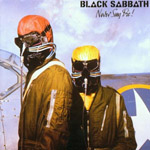
Never Say Die! (1978)
More educated ears than mine will tell you that this was an album too far for Ozzy and that the material suffers as a result. But taken at face value, there is a lot of good stuff going on here. At least initially.
Picking up the thread of shorter, tighter songs pioneered on Technical Ecstasy, ‘Never Say Die!’ sticks with the direct approach. The title track sets the driving, defiant tone for what we can once again call Side 1.
Next up, ‘Johnny Blade’ has a brilliant lyric, delivered in ironic-style out of the side of Ozzy’s mouth over a dark keyboard/guitar riff. ‘Junior’s Eyes’ follows in a landslide of smash-and-grab riffing, another great lyric allegedly about Osbourne’s father, and a blistering solo. Then into the pumping grind of ‘A Hard Road’ with an almost anthemic chorus. These four tracks fit together so well and are master strokes of sequencing.
If this album was an EP, it would be solid five star. Sadly, there is a Side 2. This is where events take a nosedive. ‘Shock Wave’ has a gritty riff, but takes in a few too many distractions along the way. ‘Air Dance’ is a weak, stylistically confused mish-mash and ‘Over To You’ has the most insipid delivery of any of Ozzy’s vocal performances over a rambling piano. ‘Breakout’ and and ‘Swinging The Chain’ are underwhelming tracks to bring down the curtain on the first and by far most important phase of Ozzy’s Sabbath career. As the lyric goes in the latter track, “We’re so sorry, sorry that it happened that way.”
Unfocused. ***
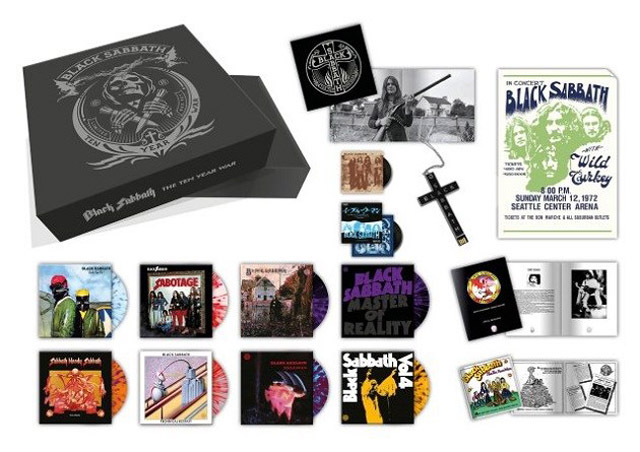
The box set (2017)
Where does this leave us then? For your £200 (retail price), The Ten Year War package gives you eight albums on heavy-weight splatter-vinyl encased in original artwork gatefold sleeves; the Ten Year War brochure; the Black Sabbath cruci-stick USB of all eight albums; and a few other goodies. When all is said and done, is it worth it? Well, the remasters sound fantastic. The music stands up absolutely, notwithstanding a few later album wobbles. Even the digital quality, disregarding the hype, is better than other technological offerings to this point. The tracks still sounds excellent even through a non-MQA player. So, yep, absolutely. To the collector, this is worth every penny. *****
Review by Dave Atkinson
Featured Artist: JOSH TAERK
Since early 2020 Josh has been entertaining us with exclusive monthly live sessions, streamed via Facebook.
In 2023 he signed a recording deal with Sony in Canada and released a new single on 15 September.

Latest session: Sunday 14 April
Check out videos here: https://www.facebook.com/getreadytorockradio
David Randall presents a weekly show on Get Ready to ROCK! Radio, Sundays at 22:00 GMT, repeated on Mondays and Fridays), when he invites listeners to ‘Assume The Position’. The show signposts forthcoming gigs and tours and latest additions at getreadytorock.com. First broadcast on 7 April 2024.
UK Blues Broadcaster of the Year (2020 and 2021 Finalist) Pete Feenstra presents his weekly Rock & Blues Show on Tuesday at 19:00 GMT as part of a five hour blues rock marathon “Tuesday is Bluesday at GRTR!”. The show is repeated on Wednesdays at 22:00, Fridays at 20:00). This show was first broadcast 2 April 2024.
How to Listen Live?
Click the programming image at the top of the page (top right of page if using desktop)
Listen via Windows Media Player. Click or tap here and “open file”
Listen via other media player (eg. VLC) Click or tap here and “open file”
Get Ready to ROCK! Radio is also in iTunes under Internet Radio/Classic Rock
Listen in via the Tunein app and search for “Get Ready to ROCK!” and save as favourite.
More information and links at our radio website where you can listen again to shows via the presenter pages: getreadytorockradio.com
Power Plays w/c 15 April 2024
ENMY The Ledge (FiXT)
KAROBELA Get Hard (indie)
KATH & THE KICKS Neptune (indie)
THE BEE TELLERS River Poem (Black Sand Records)
LAUREN FREEBIRD Like A Bomb (indie)
Featured Albums w/c 15 April 2024
09:00-12:00 The Best of 2003-2023
12:00-13:00 The Best of 2003-2023
14:00-16:00 KATARINA PEJAK – Pearls On A String (Ruf Records)
To see our Tweets you need to be logged in to a Twitter account
Popular (last 10 days)
Share the post "Album review: BLACK SABBATH – The Ten Year War (Box Set)"

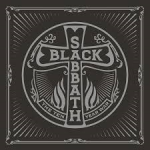

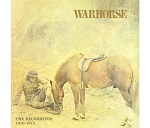

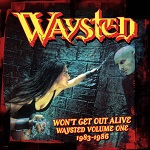




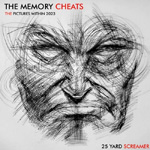
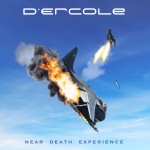

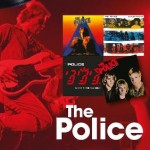
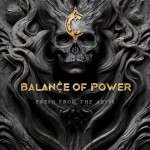
 PDF - you can delete unwanted sections
PDF - you can delete unwanted sections